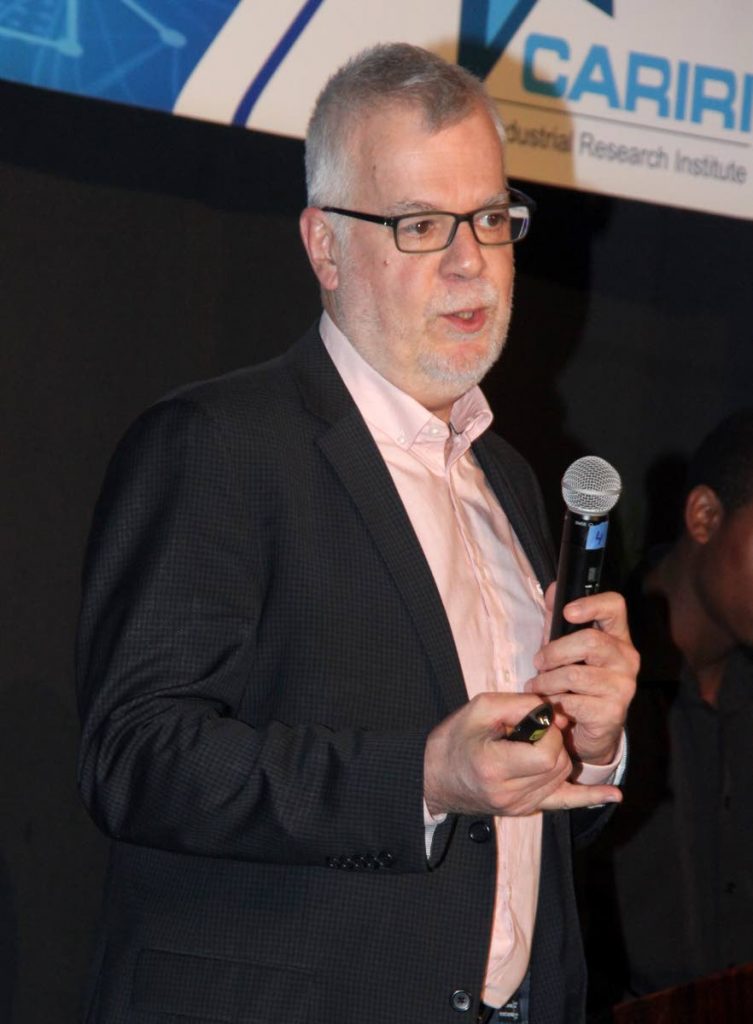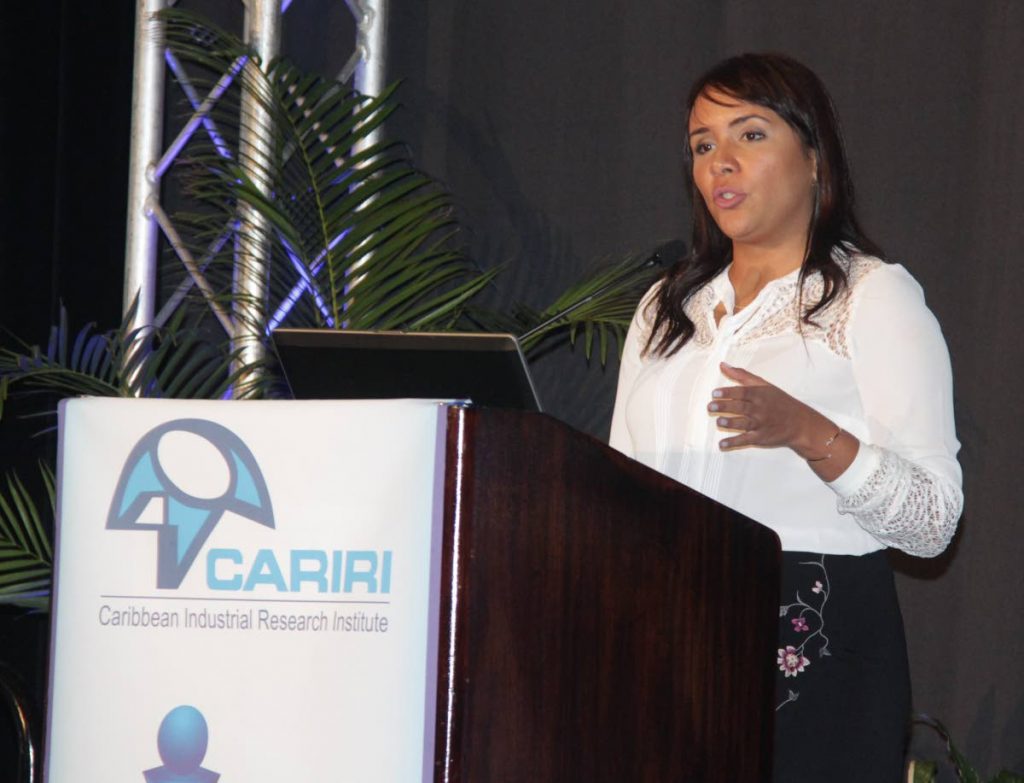The 4th industrial revolution

Marshelle Haseley
THE Caribbean Industrial Research Institute (Cariri) in collaboration with the Centre for Enterprise Development created a space for discussion on how TT can be an active part of what is known as the 4th industrial revolution.
The conference, held at the Hyatt Regency, Port of Spain on April 18 discussed advancements in various industries and how these advancements may provide useful information for further growth. Representatives of companies including Cariri, Uber, and IBM Canada made presentations on how data gathered from these digital platforms can be used to further optimise systems and institutions – while assisting organisations in better addressing the needs of a population.
Lynette Akong, ICT business coordinator at Cariri said, "As we stand at the crossroads in the future, our subject matter experts have challenged us to question and re-evaluate our perception of these technologies which drive industries forward. As we look forward to driving less cars, 3D printed buildings and the savings in money and time, it will be those organisation that invest in skills and putting these emerging technologies at the heart of consumer interactions that will thrive."

The future of mobility was discussed by Thelma Britton, senior operations and logistics manager for Panama and the Caribbean at Uber.
Uber still on the move
Uber is a modern approach to taxi services, facilitated by an online application. In cities where Uber operates, Britton said, "Users can use the rider application to request a ride. When a nearby driver-partner accepts the use's request, the application displays an estimated time of arrival for the driver-partner heading to the user's pick-up location. The application notifies the user when the driver-partner is about to arrive.
The Uber application also provides information about the driver-partner with whom the user will ride, including first name, vehicle type, and license plate number. This information helps both parties to connect at the pick-up location."
Britton spoke of the reliability of the product because of how the technology works, making it an optimal transportation system. Benefits included road safety, where Uber is used as an alternative for party-goers. She said the highest record in TT for use of the service was during Carnival 2018. She also highlighted the potential of the data collected by the application in assisting urban developers plan and optimise roadways and other utilities.
Asked about the current status of Uber in TT, Britton said, "It is not an illegal product, but it is something that is currently not contemplated in TT legislation." She said Uber is not regulated by legislation in TT because, like most of the legislation in Latin America and the Caribbean, laws were created before the internet and therefore do not support or regulate online applications.
Smarter Cities and e-govt
Daniel Poliquin from IBM Canada made a presentation on Smarter Cities, and how teams working toward creating smarter cities can play a vital role in reshaping the region. The IBM team would gather and analyse interconnected data prior to meeting with stakeholders in government, business, non government and other organisations to gather an array of perspectives about causes and possible solutions to challenges faced by the population. He said this approach helped meet the needs of citizens, such as housing and employment.
He said some of the challenges include urbanisation and decentralisation, issues related to climate change, migration and social equity.
Polquin said smarter city approaches help in managing the context of change, strategising to facilitate change and ensuring fluent execution. IBM, he said, assisted with planning, implementation and support, to ensure the transitions are smooth and remain consistent. Citizens and organisations play a major role in providing data.
The importance of a digital settlement network and the ease and practicality of e-governance was presented by chief economist at Bitt Inc, Barbados, Marla Dukharan. She said, "I am a firm believer that e-government is crucial to us achieving fiscal sustainability and transparency in the region. Already, the government of Estonia is helping the Cayman Islands government and the government of Jamaica to achieve this goal of e-government on e-government platforms." E-government includes filing documents such as birth and death certificates, property documentation, and payment of property and income taxes digitally. This, she said eliminates the middle man, therefore reducing public spending and creates greater transparency, reducing instances of corruption. Dukharan said, "4.5 per cent of the global GDP (Gross Domestic Product) is lost in corruption every year."
She also addressed the issue of gender disparity in the use of technology, emphasising how technology has made industries more open for people to work remotely. Women especially, who are unable to work in traditional office spaces, have the option of meeting the requirements of their job functions remotely by working online. Dukharan said it is therefore important to build a digitally-enabled workforce.
She believes the Caribbean has potential for tremendous growth, supported this with statistics indicating that all islands in the region are on average or above the average percentage of ICT access. In the region, she said, TT is above world average for internet access, and only Guyana and Haiti are below world average.
Business of data analytics
Dave Landry, co-founder of Data Wheel made a presentation on Big Data, business intelligence and advance data analytics. Data Wheel is a small team of programmers and designers "unveiling the big secrets in big data". The team works toward making the world’s information accessible and understandable. Landry explained how business intelligence and data analytics fit together and how they provide information that can be gathered and sorted. That information, he said, can then assist government ministries and other organisations in optimising their systems and fine tuning how they operate to best meet the needs of the population.
These approaches help in the elimination of paper use and physical mailing. The digitising of information increases efficiency and speed of processing and data integration.
Landry indicated that the body of data "tells stories about economy". He said gathering and sorting data would allow the government to see how funds are allocated, how they could be reallocated, and what percentage of the population have access health care, for example.
Question and answer segments during the seminar were facilitated by Sli.do, an online audience interaction application that is used for increased efficiency and gives participants the option of anonymity. The use of this application was a prime example of how helpful the use of technological advancements can be, and how these advancements increase efficiency and leaves less room for misinterpretation.
Akong said Cariri recognises that jobs of the future need a full spectrum of skills response, from students to retirees. So together with their technology partners, Cariri continues to design coding, digital skills and cross-platform training initiatives for participants from the classroom to the board room. Cariri has a working 3D printer and is open to facilitating ideas and projects. " We are doing our part to bring these technologies to the forefront of client solutions," she said.


Comments
"The 4th industrial revolution"